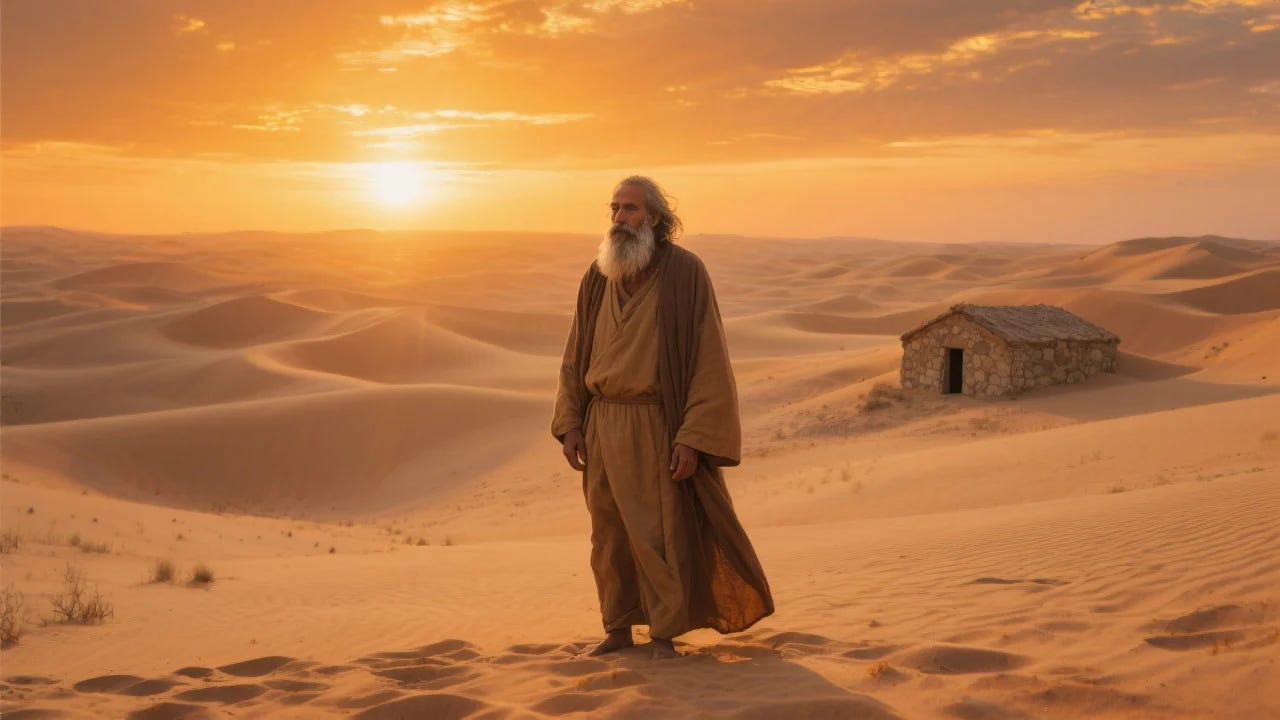Abu Dharr al‑Ghifari (RA)
The uncompromising ascetic who stood alone for justice
Who Was He?
Born in Jundab ibn Junadah around 590 CE into the Ghifar tribe—known more for raiding caravans than idols—Abu Dharr was a Born Monotheist who never bowed to paganism. An early seeker of truth, he journeyed alone to Mecca, guided only by his conviction that a Prophet had arisen. There, in the Sacred Mosque, Ali ibn Abi Talib (AS) quietly welcomed him three times until he finally led him to Prophet Muhammad (S). Abu Dharr greeted the Prophet with “As‑salāmu ‘alayka, ya Rasul Allah”—making him the first to offer the Islamic greeting—and embraced Islam on the spot, one of the earliest converts.
A Soul Forged in Solitude
Following the Prophet’s instruction, he returned to his tribe in the desert for 18 years—planting seeds of faith among them—before resurfacing during pivotal events like the Battle of the Trench, Hunayn, and Tabuk.
On the Tabuk expedition, when his camel faltered, Abu Dharr strapped his belongings on his back and ran through the desert to join the march. Deeply moved, the Prophet (S) said:
“Abu Dharr, may Allah have mercy on you— you will live alone, die alone, and rise alone”.
His Ascetic Simplicity
Abu Dharr led an austere life: coarse clothes, bare donkeys, basic meals, and long silent contemplation. When asked what true piety meant, he responded without hesitation:
“Good character and long periods of silence.”
He once noted that rich people held onto rewards of charity, while the poor gave what little they had—and would inherit Paradise.
A Voice of Conscience
During Caliph Uthman’s era, wealth and nepotism flourished. Abu Dharr publicly denounced the accumulation of riches, quoting: Quran, Surah at-Tawba, Chapter 9, The Repentance, Verse 34 against hoarders of wealth.
“O you who have believed, indeed many of the scholars and the monks devour the wealth of people unjustly and avert [them] from the way of Allah. And those who hoard gold and silver and spend it not in the way of Allah – give them tidings of a painful punishment.”
His unwavering stance angered the elite; he refused financial gifts, stating:
“I am a Muslim like others—don’t favour me above them”.
Eventually exiled—first to Syria, then to the remote desert of al‑Rabadhah—he stayed true to his word and the Prophet’s prophecy.
Enduring Glory in Exile
In al‑Rabadhah, Abu Dharr lived in poverty, refusing charity. When asked about his lack of worldly possessions, he responded,
“We are storing our treasures in the Hereafter.”
He once rejected 300 dinars from the governor of Syria, saying,
“Does the caliph have any poorer servant than I?”.
His example drew pilgrims even to that remote hut.
Death in Solitude
In 32 AH (652 CE), he passed away in that desert, accompanied only by his wife and daughter—his remaining worldly family. With just two dirhams left to shroud him, he reminded his wife:
“The Prophet promised believers would come to bury me.”
Soon after, Abdullah ibn Mas‘ūd and Malik al‑Ashtar arrived to pray over his body and bury him—fulfilling that promise.
Why His Story Still Burns
Fearless integrity – He spoke truth to power, even when alone.
Unyielding simplicity – Luxury didn’t sway him from truth.
Prophetic fulfilment – His life echoed the words of the Prophet (S).
Final Word
Abu Dharr al‑Ghifari didn’t just live Islam—he embodied it. Solitude became his crown. Poverty, his banner. Justice, his mission. In an age of excess, his voice still cuts through, challenging us: Will we follow comfort, or stand for truth—even if we stand alone?


